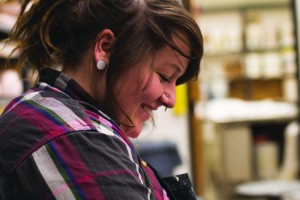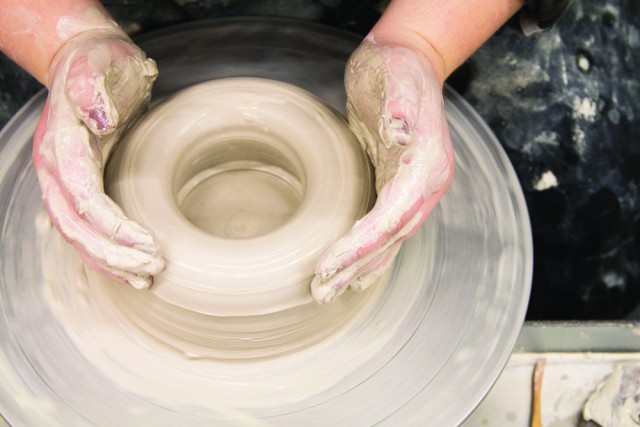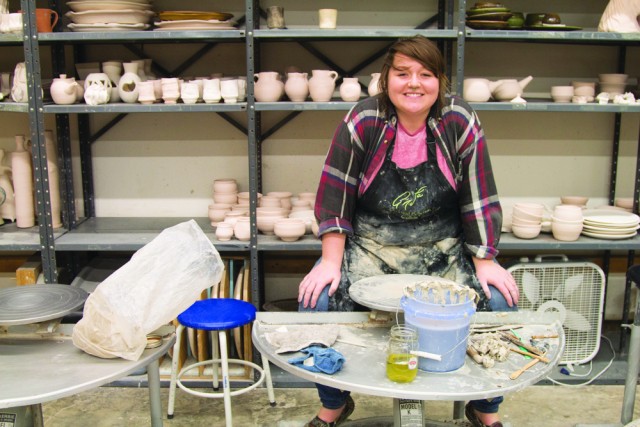“There’s no reason I should have survived and then gone on to be functional. And I still have things that come up that are a result of it all. It’s only my complete dependence on Jesus that makes anything good.”
I stared at the final sentences of a text that stretched well beyond the length of my phone’s screen. I was fully realizing the significance of what Waco junior Alice Fry, a dear friend of mine, had allowed me to be a part of in the previous weeks. I was blown away, but not at all surprised, by her humility.
Ali is a typical Baylor student. She is a ceramics art major. She goes to class and studies. She spends time with family and friends. Attending Baylor was not necessarily part of Ali’s plan, but neither was having a family to call her own.
“It’s powerful to realize what God can do with anyone’s circumstances and use them for good,” said Cindy Fry, Ali’s second adoptive mother. “She’s amazing and you can so clearly see the hand of the Lord on her life.”
 Ali was born in Louisville, Ky., to a mother who has what is most likely paranoid schizophrenia. The two spent approximately the first six years of her life in and out of homelessness. Although Ali loved her biological mother, she said their life together was chaotic.
Ali was born in Louisville, Ky., to a mother who has what is most likely paranoid schizophrenia. The two spent approximately the first six years of her life in and out of homelessness. Although Ali loved her biological mother, she said their life together was chaotic.
“Being someone that was mentally disabled, she just, didn’t have a lot of people advocating for her,” she said.
Child Protective Services placed Ali into foster care for the first time at the age of 6.
“I didn’t really understand what that meant,” Ali said.
In the next few years, Ali’s younger sister Katie was born, and the two moved back and forth between their mother and CPS. Ali saw her biological mother for the last time at age 10 during a volatile supervised home visit.
“The judge ruled that she wasn’t compliant and there was nothing more that they could do, and it was for the safety of the children that they terminate her rights and put us up for adoption,” Ali said.
When Ali was 12, she and Katie were adopted.
“Pretty quickly into the stay, it became apparent to me that it was a bad placement,” Ali said.
She and her sister moved to Fort Hood with a military couple. Ali’s adoptive father was deployed to Iraq for much of the time she spent with the family. The relationship between Ali and her adoptive mother was rooted in “mistrust, anger and control,” Ali said.
“The more she pushed, the more I pulled, and it just built into something that was devastating,” she said.
In foster care, Ali had developed a habit of hoarding food, but her adoptive mother suffered from anorexia. Ali lost about 60 pounds during her first year with the couple because of the demands her adoptive mother placed on the children regarding food and exercise. Ali said she began to steal food from her own home.
“She started to restrict me more — ‘You’re grounded because you stole food. You can’t go in the kitchen anymore. Now you can’t go downstairs by yourself anymore,’” Ali said. “She put a buzzer on my door so she’d know when I left the room.”
Her adoptive mother eventually took Ali and her sister out of public school so she could have full control of their lives, Ali said.
“It was hell,” she said. “It wasn’t even the punishment that was so bad — it was that she genuinely hated me.”
Ali began to run away from home, further straining the relationship between herself and her adoptive parents. Eventually, both parties reached their ends. When she was 14, Ali moved to Waco’s Methodist Children’s Home (MCH), a residential care facility offering school and board to children from birth to 18.
Ali said even though she was exposed to a lot of harsh realities at MCH, she thrived in that environment.
“I loved every minute of it,” she said with a laugh. “It was refreshing, and it was real.”
Although Ali’s adoptive parents had exposed her to God, MCH is where Ali really began to find her faith. With the help a staff member at the home, Ali was able to grieve for her family and all the devastation she had faced for so long.
“It was crazy to hear from God, the things he was saying,” Ali said. “I was so sold, and he was healing me.”
Ali developed a desire to attend Baylor during her senior year of high school. Ali said the situation seemed impossible because of finances, but she was awarded money by the university and moved five minutes from her home at MCH to a dorm.
“Living in trauma, you don’t think past the next day. To be honest, coming into Baylor, I thought I’d drop out the first year, and I didn’t think I’d make it this far at all,” Ali said. “I had no idea what I was doing, and I was alone, absolutely alone.”
But she wouldn’t be for long.
 FINDING HER PLACE
FINDING HER PLACE
During her freshman year at Baylor, Ali was invited to Acts Church in Waco. Ali said she experienced deep healing during her freshman year, and was able to begin the process of forgiving her adoptive mother, with whom she had cut ties after entering college.
“I was so for our family being reunited,” Ali said. “By this point they were incredibly distant. They had moved and didn’t tell me. When I graduated they pretty much dropped off the face of the earth because they were done. [There were] just so many woundings in that.”
Ali said her life was radically changed during her sophomore year. Ali said she felt God tell her he was releasing her from her relationship
with her adoptive parents, who had not communicated with her in months. The Lord said she was being released from the old so she could freely recognize the new things he was bringing to her, Ali said.
“I just wept and wept because I had no idea what that meant,” she said. “I’m ecstatic. I’m free from something I thought I would be carrying for the rest of my life, so I was completely satisfied there. I was free. I was alone, but I was free.”
Katie Fry, Ali’s best friend and a Baylor alumna, and her family also attended Acts Church. Just days after Ali said the Lord released her from her adoptive family, the Frys, with whom Ali had grown close, took her out to lunch and told her they felt like they were supposed to adopt her. Cindy Fry, Ali’s mom and a senior lecturer in the School of Engineering and Computer Science, said her husband Joe invited Ali to live with their family, but explained what that would entail for her.
“There are all kinds of pluses to that, but there are also some things you need to really strongly consider,” she said. “Being part of a family means you are responsible to that family. Being part of a family means you are under the authority of the head of that family.”
Ali said she was in shock.
“Immediately my first reaction is, ‘No. I’ve been there, done that,’” Ali said. “But then next, in my spirit I felt, ‘This is the Lord,’ because only he would do it in that time.”
Ali was adopted for a second time on Dec. 16, 2011.
Cindy said although adult adoptions are finalized faster than minor adoptions, there are other challenges associated with the process.
“With her schedule as a college student, and with everybody else’s schedules, it’s really tough to have time to talk and get to know each other,” Cindy said. “You know, you don’t have to do that with your regular kids because you’ve had them all your life, so our process has just been getting to know our daughter better because we didn’t have those years with her.”
Ali’s presence has encouraged her family members to think in new ways, Cindy said.
“Ali, because of her life and upbringing, is very passionate about helping people who, for one reason or another, can’t do things for themselves,” Cindy said. “She has forced us to re-examine how we feel about a lot of issues because she brings a new perspective that we haven’t even considered.”
Ali said being part of her family has been a learning experience for her as well.
“It’s been this journey and process with my parents, them having so much grace for me, and learning to trust again,” Ali said. “To trust the Lord and their presence in my life, and allowing the fullness of redemption because family is something that I never wanted, but that was always the Lord’s plan.”
Ali said she readily credits the Lord with the radical transformation that has occurred in her heart and life. Despite the seeming “happy ending” of her life, Ali said she is still being renewed and healed by God.
“There’s a process in that, and there’s still things that the Lord brings up, and places of pain that will cause bouts of depression,” Ali said. “But the Lord is so faithful to meet with us and to set us free and to heal. He just loves to redeem. That’s who he is.”
ART FOR THE PEOPLE
Ali has encouraged members of the Baylor and Waco communities with her story for years. Greg Lewallen, lecturer in the art department, said he met Ali during her freshman year.
 “She’s a creative individual,” he said. “I found what was intriguing to me, and what made me pry deeper to get to know what her story is and everything, is she’s very honest and really very open about sharing. She doesn’t try to hide.”
“She’s a creative individual,” he said. “I found what was intriguing to me, and what made me pry deeper to get to know what her story is and everything, is she’s very honest and really very open about sharing. She doesn’t try to hide.”
Although he generally tries to get to know his students on a deeper level, Lewallen said Ali’s story was particularly interesting and inspiring to him.
“For her to have this beautiful demeanor about her in spite of the really tragic circumstances of her upbringing is pretty much overwhelming,” Lewallen said. “She has every excuse in the world to be an entirely different person, but she’s chosen to not let that bring her down an entirely different path.”
Lewallen said Ali has a lot to teach others.
“If you can’t see what forgiveness does in a person’s life, through looking at Ali, then you’re not ever going to understand it,” Lewallen said.
A ceramics art major, Ali said she desires to create with people in mind. Art is a useful tool when working with the poor, and it also helps instill a sense of community in the group as they work together, Ali said.
“Because my life experience has shaped me to really value people and to care about the poor and the oppressed, I’m just interested in doing things that change the world, that affects people, that heals and brings life,” Ali said.
Ali recalled a critique in which her ceramics professor criticized her work, asking why she had created a nonfunctional bowl with high walls. Ali’s personal aesthetic often involves creating bowls because they facilitate community.
“I started talking about it,” Ali said. “And he said, ‘I think it’s fine that it’s not functional, and knowing that there’s a reason why your work looks like this, and you’re going to learn something about yourself from it.”
Ali said being an artist allows her to embody an important part of God’s character.
“Creator, you know, is the first way that God revealed himself to the world,” she said. “I think we were made in God’s image. He’s our dad, and our dads love it when we’re like, ‘I’m being like daddy.’ I’m mimicking my father. I just believe that it’s reflecting him, and the Lord finds so much joy (in it).”
Story and photos by: Rae Jefferson | Arts and Entertainment Editor






